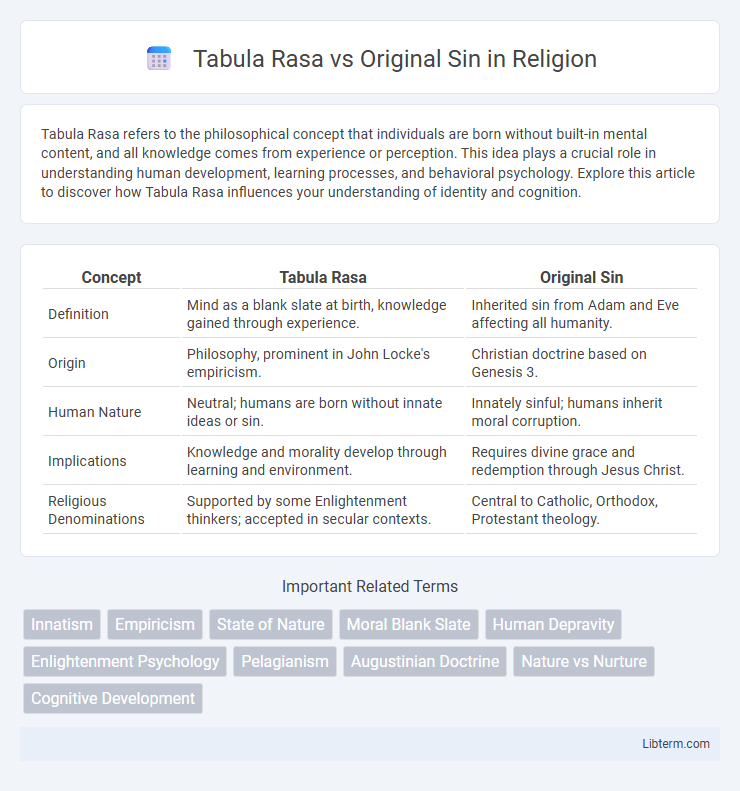Tabula Rasa refers to the philosophical concept that individuals are born without built-in mental content, and all knowledge comes from experience or perception. This idea plays a crucial role in understanding human development, learning processes, and behavioral psychology. Explore this article to discover how Tabula Rasa influences your understanding of identity and cognition.
Table of Comparison
| Concept | Tabula Rasa | Original Sin |
|---|---|---|
| Definition | Mind as a blank slate at birth, knowledge gained through experience. | Inherited sin from Adam and Eve affecting all humanity. |
| Origin | Philosophy, prominent in John Locke's empiricism. | Christian doctrine based on Genesis 3. |
| Human Nature | Neutral; humans are born without innate ideas or sin. | Innately sinful; humans inherit moral corruption. |
| Implications | Knowledge and morality develop through learning and environment. | Requires divine grace and redemption through Jesus Christ. |
| Religious Denominations | Supported by some Enlightenment thinkers; accepted in secular contexts. | Central to Catholic, Orthodox, Protestant theology. |
Introduction to Tabula Rasa and Original Sin
Tabula Rasa, a philosophical concept rooted in empiricism, posits that humans are born without innate ideas, and knowledge is acquired through experience and sensory perception. In contrast, the doctrine of Original Sin, central to Christian theology, asserts that humanity inherits a sinful nature due to Adam and Eve's transgression, affecting human morality from birth. These foundational views shape debates on human nature, free will, and moral development.
Historical Context of the Concepts
The concepts of Tabula Rasa and Original Sin emerged from distinct historical and philosophical contexts, with Tabula Rasa rooted in Enlightenment empiricism, particularly John Locke's 17th-century theory that the human mind begins as a blank slate shaped by experience. In contrast, Original Sin originates from early Christian theology, especially Augustine of Hippo's 4th-century writings, which emphasized inherited sinfulness passed down from Adam and Eve. These divergent foundations reflect the secular focus on knowledge acquisition in Tabula Rasa versus the religious emphasis on moral and spiritual condition in Original Sin.
Philosophical Foundations: Locke and Augustine
John Locke's philosophy of Tabula Rasa asserts that the human mind is a blank slate at birth, shaped entirely by experience and sensory input, emphasizing empiricism and individual development. Augustine's doctrine of Original Sin posits that humans inherit a sinful nature due to Adam's transgression, underscoring intrinsic moral corruption and the necessity of divine grace. These contrasting foundations illustrate the debate between experiential knowledge acquisition and inherent moral conditions in human nature.
Religious Perspectives on Human Nature
Religious perspectives on human nature diverge significantly between Tabula Rasa and Original Sin doctrines. Tabula Rasa, often associated with Enlightenment thought, suggests humans are born without innate moral qualities, emphasizing experience and environment in shaping character. In contrast, Original Sin, central to Christian theology, posits that humans inherit a sinful nature from Adam and Eve, necessitating divine grace for redemption and moral transformation.
Psychological Implications of Each View
Tabula Rasa, rooted in John Locke's philosophy, suggests the human mind begins as a blank slate, emphasizing environmental influence on psychological development and behavior. Original Sin, derived from Christian theology, posits inherent moral flaws at birth, which can lead to psychological interpretations involving innate guilt, struggle for redemption, and predisposition to negative traits. These contrasting views shape approaches in psychology regarding nature versus nurture, moral development, and the genesis of human behavior patterns.
Educational Approaches Stemming from Both Beliefs
Educational approaches rooted in Tabula Rasa emphasize experiential learning, fostering environments where knowledge is acquired through interaction and sensory experiences, reflecting John Locke's view of the mind as a blank slate. In contrast, pedagogies influenced by Original Sin often incorporate moral instruction and discipline, underscoring the belief in inherent human imperfection that requires guidance and redemption. These divergent foundations shape curricula that either prioritize individual development through empirical evidence or stress the cultivation of virtuous character in response to innate tendencies.
Impact on Moral and Ethical Theories
Tabula Rasa, emphasizing the mind as a blank slate shaped by experience, influences moral theories that prioritize environmental factors and learning in ethical development. Original Sin posits inherent moral flaws, reinforcing doctrines of innate human imperfection and the necessity of divine grace for moral improvement. These contrasting views impact ethical frameworks by framing human nature either as moldable through nurture or fundamentally flawed, shaping approaches to responsibility, punishment, and moral education.
Modern Debates: Science and Human Nature
Modern debates on Tabula Rasa versus Original Sin center around scientific research in psychology and genetics that challenges the notion of a purely blank slate at birth, highlighting innate cognitive structures and predispositions. Neuroscientific findings demonstrate that the brain's architecture influences behavior, supporting Original Sin's idea of inherent traits, while environmental factors emphasize the Tabula Rasa perspective through plasticity and learning. Contemporary discussions integrate epigenetics, showing gene-environment interactions that complicate the binary, illustrating that human nature is shaped by both inherited tendencies and experiential input.
Societal and Cultural Influences of the Doctrines
The doctrines of Tabula Rasa and Original Sin reflect contrasting views on human nature shaped by societal and cultural influences; Tabula Rasa emphasizes the environment's role in shaping individuals, highlighting the importance of education and social context in personal development. Original Sin, rooted in Christian theology, underscores inherent human imperfection, influencing cultural norms around morality, guilt, and redemption. These beliefs shape legal systems, moral codes, and educational practices within societies by defining whether behavior is seen as learned or innate.
Conclusion: Reconciling Tabula Rasa and Original Sin
Reconciling Tabula Rasa and Original Sin involves recognizing that human nature encompasses both inherent moral tendencies and the potential for learning and growth through experience. While Original Sin emphasizes innate imperfection and moral challenges, Tabula Rasa highlights the mind's receptiveness to environmental influence and education. Integrating these concepts suggests that individuals are born with a complex interplay of inherited dispositions and blank-slate potential, necessitating nurturing environments to develop ethical and intellectual capacities.
Tabula Rasa Infographic

 libterm.com
libterm.com